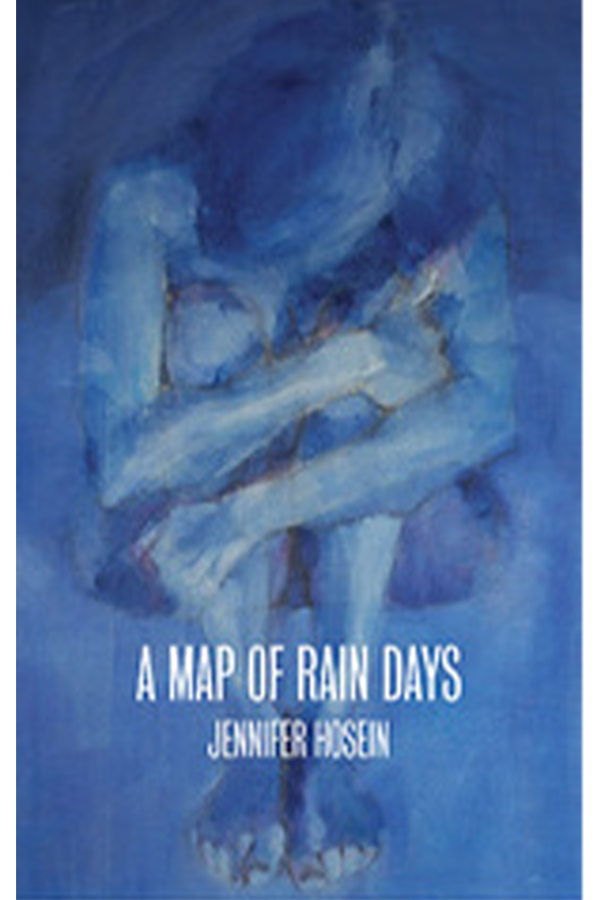As the title suggests, poet-painter Jennifer Hosein’s A Map of Rain Days conjures loss and despair. Her paintings and sketches at the start of each section portray a woman turned inward, her back to the world. Her collection is an unflinching evocation of the physical and emotional violence men can do to women under the pretext of love. Her poems, that describe the wounds inflicted by racism, are also visceral and visual. However, Hosein’s love for her mother and daughter shines through even the bleakest of her poems.

In “I Love You” a male speaker promises love, but threatens: “I’ll cut your tongue out / so you can’t speak…” He vows to cut off his female lover’s feet and hands to steal her mobility and independence. She defiantly asks if he will cut out her cunt, but in the end, the male speaker retains control. Love’s theft of a woman’s autonomy is echoed in “Spark.” The female narrator recalls the consequences of supporting a homeless male lover: “I took you in / and you took me over / the way a spark / consumes a forest….”
In “White” the narrator recounts how she used to daydream “that White / was a tablet / you could place / on your tongue / … morning / would be a better place.” In the present moment, she describes herself as “almost white,” passing through doors where “no one sees [her] / or calls [her] names / to [her] face.” But she realizes that since growing up, she has changed: she doesn’t wish “to be white / anymore” even though racism is on the rise. In “Streets” we learn more about the narrator’s lingering wounds from racism, how she was “the brown-hued devil // that lived beneath the bridge” and the townspeople “fanned away from the dark shadow / that spilled out of [her] like blood.” These graphic fairy tale-like scenes effectively conjure how vulnerable the narrator felt as a brown-skinned child in Canada, as does the poem “Face,” in which the narrator was “a blood-spot // on a crisp / white shirt….”
Interspersed throughout the collection are poems inspired by Hosein’s mother and daughter. In the title poem, the narrator evokes empathy for her mother, walking “down the corridors / in [her] mother’s bruised shoes.” She feels her mother’s suffering, “toes… / crooked and curled // in a misguided, arthritic map / of rain days.” In the poem “Heart” the mother “begins to drift away” and the narrator describes her family’s reaction: “but we are selfish / and tell her / to let them fix it.” With a vulnerable, elderly mother of my own I found Hosein’s evocation of her mother’s decline very moving: “face fallen / buttons askew / and pants / half on the floor….” In the poem “January,” Hosein’s narrator is determined to bring her daughter a birthday cake before midnight, but she is also her mother’s caretaker and is torn between love for them both. During a quick visit, Hosein’s narrator pulls a nightgown over her mother’s head and tucks her “into the cold, stinking night.” Hosein’s narrator then successfully turns her attention to her daughter’s birthday: “Love fills [her] up like a balloon, / so full and stretched and thin” is she as caretaker. The mother and daughter poems in A Map of Rain Days part heavy curtains to let in the light. Jennifer Hosein’s poems triumph over loss. Love for family illuminates her life.
Bios
Kate Rogers
Kate Rogers next poetry collection, The Meaning of Leaving, is forthcoming with Montreal-based publisher, Ace of Swords (AOS), in early 2024. Her poems recently appeared in SubTerrain, The Windsor Review and Looking Back at Hong Kong (Chinese University of Hong Kong). Kate’s reviews have appeared in The Goose, Ricepaper and Prism International. Kate is a Co-Director of Art Bar, Toronto’s oldest poetry only reading series. More at: katerogers.ca/ [updated November 2023]

